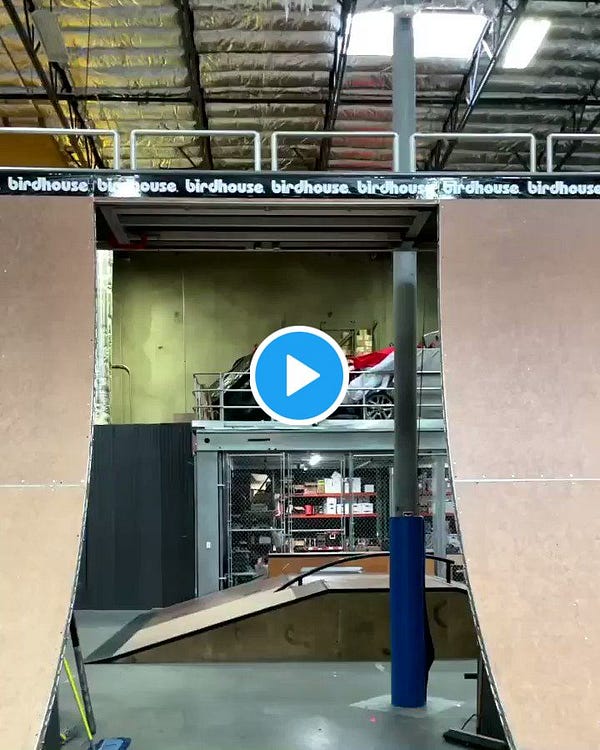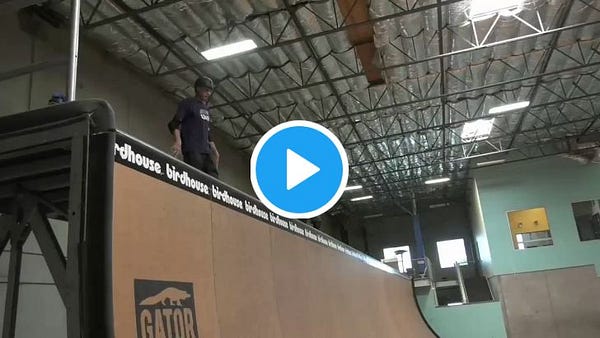Posting Through Your Own Mortality
Tony Hawk is retiring... tricks.
Every few weeks, legendary professional skateboarder Tony Hawk will trend on Twitter. Usually, it’s because he’s shared an anecdote that goes viral of a stranger asking if he knows that he looks just like Tony Hawk—an occurrence so common it’s become its own meme. Other times, it’s because Hawk is struggling to land a skateboarding trick that he pioneered from his youth, tearily claiming to the camera that it will be the last time he’s able to do it as he climbs further into his 50s.
These bits acknowledge a self-perceived liminal space that Hawk exists in, somewhere between the successes of his athletic prime, the celebrity it garnered him, and the disconnect of living in a world that exists in the latter as he drifts further from the abilities of the former. Both also clearly serve as social media brand-building exercises, but if you look at your timeline long enough and bring your face right up to the screen, you’ll see seams of truth: these are pieces of mid-life performance art. A way for his present self to contend with the past and recognize what future may lie ahead (and sell some skincare lotion along the way).
A cursory scroll through Hawk’s Twitter feed makes one thing clear: he’s still an incredibly viable product marketer. Promotions with GoDaddy, Crash Bandicoot, and Pacifico dot his profile from just the last few months alone. They mingle with the proof of Hawk’s permanence in popular culture. A cameo on Whose Line Is It Anyway from 2017 is just a few flicks of the finger away from a two-decade-old stunt-spot on MTV’s Senseless Acts of Video.


In these clips, we see Hawk as what he became to the masses in the late ‘90s: the archetypal skateboarder with a southern Californian lilt. He’s remained skateboarding’s primary cultural touchpoint and its most popular name since. His iconic video game franchise, released in ‘99, helped push him to that point of ubiquity, but his landing of the first-ever 900 at the X-Games that same year is what solidified his credentials to the layperson. It was a uniquely captivating sporting moment that made sense to the uninitiated watching at home: he’d spun around in the air on a skateboard more than anyone else in the world ever had or could before. Which proved he was the absolute best person at doing this thing, because how could it not—if you watched the crowd rush Hawk after he landed the trick like he’d just scored a buzzer-beater to win the Larry O’Brien—it was undeniable.
In the decades since, Hawk has done everything there is to do in the career of a professional skateboarder and lightyears more. He’s owned his own companies, promoted cars and bagel bites, guest-starred on an episode of The Simpsons, become a meme, and has continued to innovate on his skateboard right into his 50s. Judging by his online presence, he seems to be in a good place. And why shouldn’t he? You’d hope finding such a singular success would have that effect. It would also put his efforts at retiring tricks from his past into context—it’s a lot easier to mourn when you have your life in order.
When Hawk did his last documented 900 at 48 years old, it was an unofficial send-off to the particular twisting of a body from which an entire personal industry bloomed. Then the odometer ticked past fifty.



His self-proclaimed “last ever” Ollie 540 he landed at 52 years old this past March? That was a funeral. When Hawk finally rode away, it was like he’d placed the body in the casket himself. The history and emotions attached to the maneuver evident as he collapsed to his knees and wept. “Happy I made it,” the fitting last words for a piece of one’s physical life that made it better a few seconds at a time.
But, it should be noted, these are ultimately deaths he’s issuing. Who’s to say he can’t do another 540 at 54? We have to take his word. There are other tricks he’s exhumed, acknowledging that he might leave them propped up in a chair wearing sunglasses until it’s time to play with them again.


Or if the past calls loud enough, he might skip the seance and bring the backhoe to the cemetery.


It must be hard to contend with the limits of your own mortality when you continue to push back on them every day, when the limits are unknown and mostly self-imposed. How those same physical abilities you’re condoning off are what helped you become who you are and how you pay your bills.
Hawk knows he’s almost out of season, which is why he’s picking and choosing what ornaments to take off the tree first, starting with the star and working his way down. How long before this becomes a fire hazard? Who knows. But why not make a show of it? Especially in a world that doesn’t always recognize you at first, it might feel necessary to remind them one more time of what you’ve done. So when they see you in an airplane, at participating Chipotle locations, or out on clear blue waters, they don’t ask if you’re you—they know.


